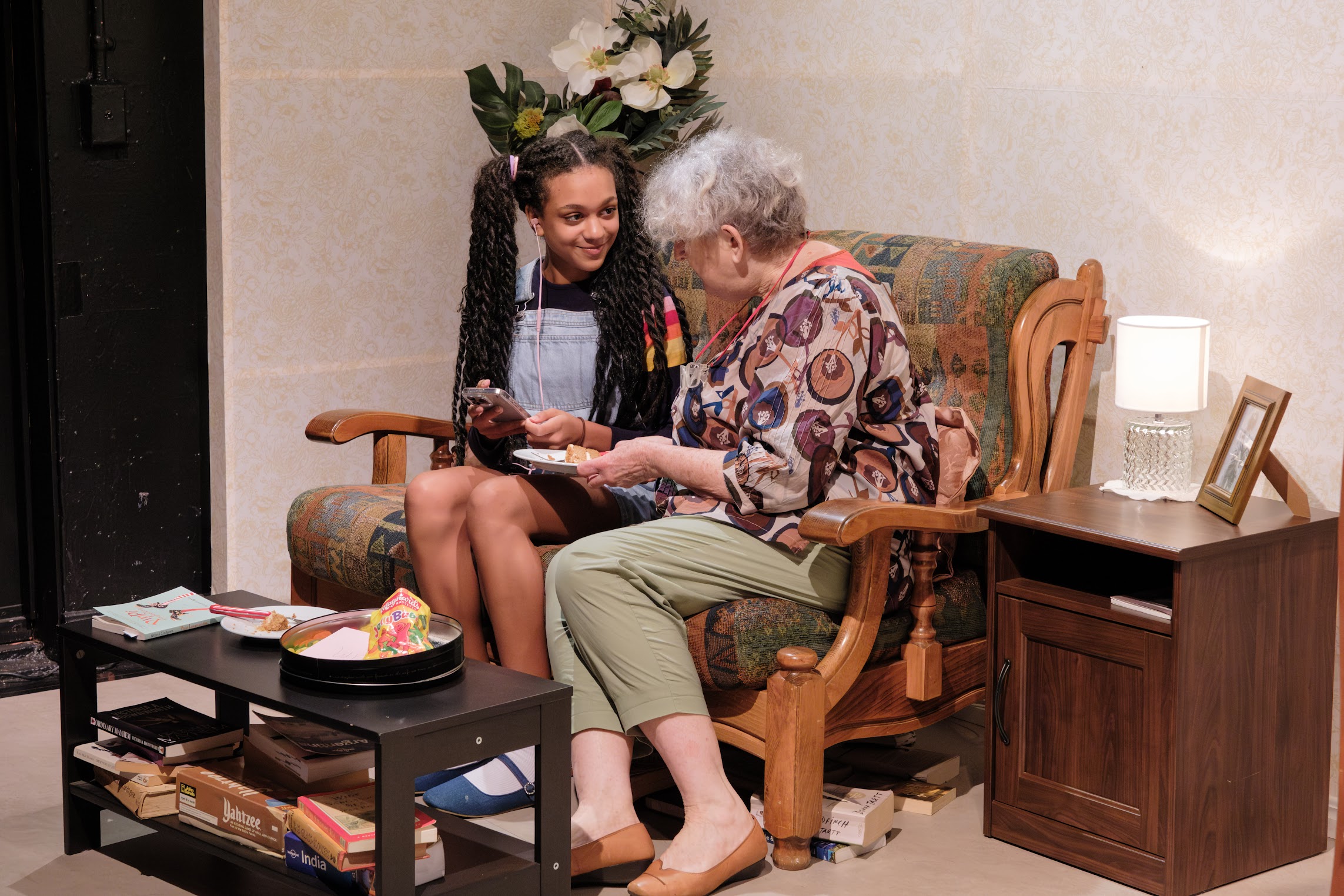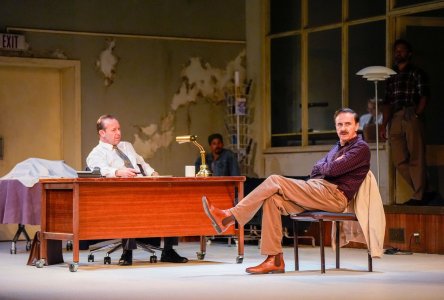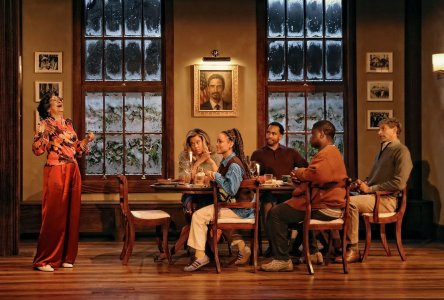
THE GOLDEN AGE
THE GOLDEN AGE, Sydney Theatre Company at Wharf 1, 14 January-20 February 2016. Photography by Lisa Tomasetti; above: back - Robert Menzies, Sarah Peirse, Anthony Taufa; front - Liam Nunan, Rarriwuy Hick and Zindzi Okenyo; right: Ursula Yovich.
“Nowt more outcasten" – in the dialect of the lost tribe – could well be applied to this great play by Louis Nowra that hasn’t been seen on a Sydney main stage since its premiere production in 1987. And it’s a play that should be embraced and placed at the heart of contemporary Australian culture.
Epic in scope, imagination and themes, The Golden Age is a title of exquisite and painful irony. In a recent interview with Elissa Blake in the Sydney Morning Herald, director Kip Williams succinctly summed it up: “There is a political conversation going on inside the play – constant questions about who belongs where and why, and about the idea of a hierarchy of cultures – but at the same time there is also a theatrical conversation happening, too.”
The play opens with Mrs Elizabeth Archer (Ursula Yovich) a bourgeoise of Hobart town, declaiming Greek tragedy in florid Olivier style in the English model garden of her gracious home. Her audience is a captive one of local worthies, expected to dig deep into their pockets in aid of a charity in return for release from this torture.
The setting is 1939 but it could also be Darling Point 2016 with the easy sense of superiority and indifference to lesser beings as well as an undercurrent of insecurity based in that same snobbery. It’s acidly illustrated in a scene with the Archers’ son Peter (Remy Hii) and his university pal and working class achiever Francis (Brandon McClelland) who fails to don the correct tennis whites for a game on the home court.
William Archer (Robert Menzies) is a doctor and therefore a pillar of polite society. When Francis and Peter go off bush walking in the south-west wilderness and return with the “lost tribe” they discover there, it is Dr Archer who is immediately drawn to them as medical and human specimens.
Nowra first came across the true origins of his story in 1984 from a Monash academic. He told of a mob of whiteys who were the third generation survivors of a group that had retreated to the uncharted wilderness in the mid-1800s. The make-up of that original clan is pretty much modern Australia in microcosm: criminals, the profoundly simple and an itinerant actor.
Unknowingly – and piquantly – the clan mirrors Mrs Archer’s dramatic bent when they treat the two young men, within minutes of their arrival, to a bowdlerised and truncated – but clearly recognisable – version of King Lear. The anthropology of the group is fascinating and the thought and imagination put into their dialect and way of life by the playwright is immensely satisfying.
(In the program is an extensive glossary of the dialect which Nowra devised from studying the language of the 1800s English and Irish lower class, popular bawdy songs and verse and, of course, the drama of the day.)
Tragically the group’s small numbers, the absence of new breeding blood, already present genetic weakness and infertility has led to this physically and mentally failing remnant. Unfortunately, and not very smartly, with the rise of Hitler and Nazi Germany on the horizon they are seen as evidence to support his theories of racial superiority. The group – led by Ayre (Sarah Peirse) with Melorne (Robert Menzies), Angel (Zindzi Okenyo), Stef (Liam Nunan), Mac (Anthony Taufa) and Betshed (Rarriwuy Hick) – are hidden away in the New Norfolk Asylum for the duration.

Predictably the effect of incarceration in what was then often referred to in merry euphemism as a loony bin, was catastrophic. Only Ayre and Betshed have language and Dr Archer the only outsider to understand them. The love that blossoms between Betshed and Francis is cruelly interrupted by World War II. (How do you explain war, going overseas and being gone for a long time to someone who has no concept of any of it?)
Francis and Peter survive the war and meet in dreadful circumstances in Berlin before returning to Tasmania. Peter is angrily aware of Australia’s complacency and shortsightedness (recognise anything?) and cannot resume life as before: mired in the refusal of uncomfortable truths that quickly came to characterise the smugness of the Menzies era.
What happens, throughout the play, is at once alien and all too familiar. It is also captivating and beautifully told in Kip Williams’ clear and sensitive production. It is played on a great mound of rich, dark earth which is surrounded by a monochromatic emptiness given shape and place through lighting states. Civilisation is signified by a fragment of Greek column, the wilderness by fragments of trees and so on. (Design by David Fleischer, lighting by Damien Cooper.)
Although written some 30 years ago and ostensibly a period drama, the politics of the piece are painfully up to the minute and the play is as fresh and relevant as tomorrow. The company is a spectacularly fine ensemble with the doubled and trebled roles given sharp-edged difference and depth.
As well it has to be said that the remarkable Sarah Peirse is … remarkable; Ursula Yovich and Robert Menzies both dig deep to authenticity, while STC newcomer Liam Nunan is heartbreaking as the physical and mental ruin, Stef. As Betsheb, Rarriwuy Hick is exceptional, carrying the weight of her history and the transition to “civilisation” without a moment of cheap sentimentality.
Mention should also be made of Max Lyandvert’s fabulous music and sound design and Charmian Gradwell’s work with Peirse and Hick in making the dialect sound spoken and everyday and not a gimmick. If people talk Na’avi these days it’s conceivable that someone should take up this lingo for further development.
The Golden Age opens Sydney Theatre Company’s year with the kind of ambition and production we should be able to expect of the state theatre company. No wonder it was Andrew Upton’s choice as favourite in his farewell program. Don’t miss it: a marvellous production of a marvellous play.



